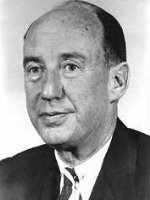Adlai Stevenson
From dKosopedia
Adlai Ewing Stevenson II (1900-1965) was the Democrat nominee for president in 1952 and 1956. Stevenson was well-known for his intelligence and biting wit. Journalist Jack Germond one commented that Stevenson and Morris Udall were "too funny" to be president.
Stevenson was born to a longtime Illinois political family (his grandfather and namesake had served as Vice-President under Grover Cleveland), and gre up in Bloomington, Illinois. Stevenson later attended Princeton, where he became editor of the school newspaper. Stevenson's first love was journalism, and when he attended Harvard Law School at the prodding of his father he soon flunked out. But after a chance encounter with Oliver Wendell Holmes, Stevenson became interested in the law, and decided to finish his legal education at Northwestern University.
Stevenson has the dubious honor of being the first divorced man to run for president. He had married Ellen Borden in 1928, but they divorced in 1949. Stevenson never remarried, although he dated many women afterwards, including Washington Post owner Katherine Graham.
Stevenson got into politics rather indirectly in 1933, when he became general counsel of the short-lived Agricultural Adjustment Administration. Stevenson later served as principal attorney for Frank Knox, Republican Vice-Presidential candidate in 1936, and newly-appointed Secretary of the Navy. After Knox's 1944 death, Stevenson attempted to purchase his old boss' newspaper company, but was outbid. He later accepted a "temporary" job at the State Department and helped to negotiate the formation of the United Nations.
Stevenson was encouraged by friends to run for political office, and he ran for governor of Illinois in 1948, defeating the GOP incumbent in a landslide. As Illinois governor, he reorganized the state police, cracking down on illegal gambling, and improving the state highway system. His wit made him a popular public speaker, and his commitment to his job (he often worked late) attracted the attention of national party leaders.
In 1952, President Harry Truman suggested that Stevenson seek the Democratic presidential nomination. Stevenson equivocated, wanting to run for another term as Illinois governor, but was drafted by the Democratic convention and placed on the ticket anyhow. Running against war hero Dwight Eisenhower, Stevenson realized his chances were slim, but campaigned hard, and pointed out the inconsistencies in the Republicans (Eisenhower claimed he wanted no part of Joseph McCarthy's "red baiting," but had picked abrasive HUAC member Richard Nixon for Vice-President, for instance). But Ike's promise to go to Korea probably spelled the end of Stevenson's hopes for an upset; he lost the popular vote 55-44, and the electoral vote 442-89.
Stevenson had much greater hopes for victory in 1956; while the economy was still in good shape, Eisenhower's health seemed to be failing, and many began to worry that he might be to ill to serve another full term. Stevenson campaigned actively for the nomination this time, fending off Estes Kefauver of Tennessee and Avrell Harriman of New York. Stevenson sppeared at first to be polling better than he had in 1952, but his hopes were dashed when, in October, Eisenhower was given a clean bill of health and foreign crises in Egypt and Hungary convinced many that a change in leadership might be dangerous. Stevenson ended up losing by slightly more than he had in 1952 (57-42 in the popular vote, 457-74 in the elctoral college).
Stevenson campaigned actively for the candidacy of John F. Kennedy in 1960, and due to his work in founding the U.N., he was the natural choice for U.N. Ambassador after Kennedy's win. His most famous moment in this capacity came during the Cuban Missile Crisis, when he told the Soviet ambassador that he would wait until "hell freezes over" for his answer if need be.
Stevenson was assaulted by an anti-U.N. fanatic in Dallas, TX, not far from where Kennedy was killed. This assault was partly what convinced Kennedy to travel there, as Dallas was percieved as being hostile to the Kennedy administration.
Stevenson died suddenly of heart failure in July 1965. The funeral was attended by President Lyndon Johnson, Vice-President Hubert Humphrey, and Chief Justice Earl Warren. Stevenson's eldest son, also named Adlai, was later a U.S. Senator from Illinois (1970-1981).

![[Main Page]](../../../../upload/banner-blue-135.jpg)